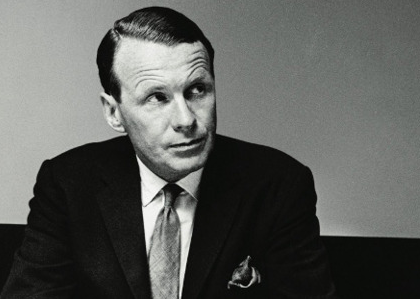Hi there people! How's your Tuesday?
Ours is super awesome with fun filled activities and tons of inspiring and creative work.
We've been showing you lots of pictures and yet too little info on our advertising world. So let's get more insights on this part of industry with this month's highlighted Karismatic Hero - none other than David Ogilvy himself.
If you haven't heard of him yet, David Ogilvy is one of the most recognised Ad Men in the world.
In 1948, the iconic businessman founded a New York-based ad agency - Hewitt, Ogilvy, Benson & Mather, which eventually became Ogilvy & Mather Worldwide (there's even one in Kuala Lumpur). But do you know that in the starting of his advertising career,Ogilvy was only a salesman and had never ever written an advertisement in his life?
It's truly amazing how sheer determination and lovable passion can change a salesman into a successful Ad Man with an enormous advertising empire. Up to today, Ogilvy remains as one of the famous names in advertising and known as one of the strategist thinkers (others include Raymond Rubicam, Leo Burnett, William Bernbach and Ted Bates) who has shaped the advertising business since 1920s.
On 7 September, 1982, Ogilvy sent the following internal memo to all agency employees, tittled "How to Write". The tips are pretty great, maybe you can use them in your life too!
The better you write, the higher you go in Ogilvy & Mather. People who think well, write well.Woolly minded people write woolly memos, woolly letters and woolly speeches.Good writing is not a natural gift. You have to learn to write well. Here are 10 hints:1. Read the Roman-Raphaelson book on writing. Read it three times.2. Write the way you talk. Naturally.3. Use short words, short sentences and short paragraphs.4. Never use jargon words like reconceptualize,demassification, attitudinally, judgmentally. They are hallmarks of a pretentious ass.5. Never write more than two pages on any subject.6. Check your quotations.7. Never send a letter or a memo on the day you write it. Read it aloud the next morning — and then edit it.8. If it is something important, get a colleague to improve it.9. Before you send your letter or your memo, make sure it is crystal clear what you want the recipient to do.10. If you want ACTION, don’t write. Go and tell the guy what you want.David
(source: Taken from http://www.brainpickings.org/index.php/2012/02/07/david-ogilvy-on-writing/)

No comments:
Post a Comment